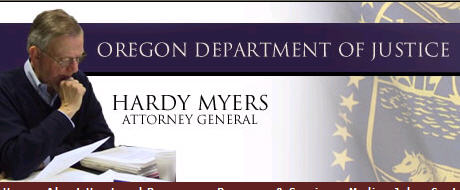Business
Oregon AG office to RIAA: 10 things we want to know about how you find file-sharing students
If you think the Recording Institute Association of America is going too far in its prosecution (or should that be persecution?) of college students who file-share from time to time, you'll love the news that Oregon Attorney General Hardy Myers is adding meat to the University of Oregon's effort to quash a subpoena seeking to reveal the names of students who have been file-sharing over university servers.

If you think the Recording Institute Association of America is going too far in its prosecution (or should that be persecution?) of college students who file-share from time to time, you'll love the news that Oregon Attorney General Hardy Myers is adding meat to the University of Oregon's effort to quash a subpoena seeking to reveal the names of students who have been file-sharing over university servers.
Myers' office isn't just stopping there. They are filing a petition requesting immediate discovery into how the RIAA obtains this information.
Ten points from the discovery attempt, as made by Myers office:
- Carlos Linares, upon whose declaration the subpoena was issued, had no first hand information whatsoever;
- the RIAA's "data mining" investigation does not reveal how the files were obtained or whether they were ever shared with anyone;
- the RIAA papers did not show that any infringing activity actually took place;
- MediaSentry appears to have been conducting an investigation without an investigator's license, in violation of ORS 703.405 and ORS 703.993(s), which is a crime;
- in Atlantic v. Andersen, based on the same theories and investigative techniques as those used here, they had been found by the Court to have stalled and resisted discovery, before abandoning their case rather than oppose Ms. Andersen's summary judgment motion;
- the RIAA appears to have been abusing the judicial process by obtaining information through subpoenas which it then hands over to "collection firms" using them "to leverage payment of arbitrary sums of money, based on threats and evidence from the data mining";
- the RIAA concealed a material fact from its original ex parte motion papers, which sought to create the aura of an emergency and the need for immediate ex parte action -- the fact that the University had informed the RIAA in July that the requested information had been gathered and would be preserved;
- the RIAA lawyers falsely implied that the Attorney General's office had failed to "meet and confer" with them prior to making the motion to quash, even though the AG's office had in fact conferred with the RIAA's lawyers;
- the deposition testimony of the RIAA's expert witness Doug Jacobson in UMG v. Lindor tends to indicate that the RIAA has already accessed private information on the computers of University of Oregon students; and
- the RIAA has failed to provide an affidavit of the individual who actually conducted the 'investigation'.
Which side are you on, the Oregon AG? RIAA, some of both, or neither?
